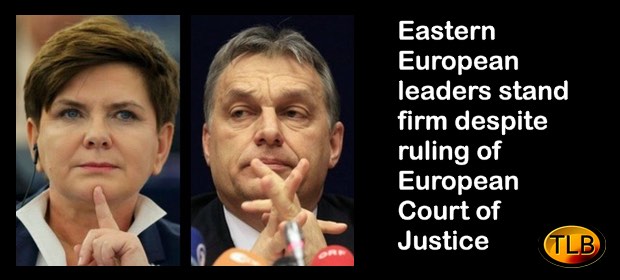
European Court Orders EU Countries to Take Migrants
“Politics has raped European law and values.”
SOEREN KERN
- The September 6 ruling, which has been hailed as a victory for European federalism, highlights the degree to which the European Union has usurped decision-making powers from its 28 member states. The ruling also showcases how the EU’s organs of jurisprudence have become politicized.
- Many so-called asylum seekers have refused to relocate to Central and Eastern Europe because the financial benefits there are not as generous as in France, Germany or Scandinavia.
- “Let us not forget that those arriving have been raised in another religion, and represent a radically different culture. Most of them are not Christians, but Muslims. This is an important question, because Europe and European identity is rooted in Christianity. Is it not worrying in itself that European Christianity is now barely able to keep Europe Christian? If we lose sight of this, the idea of Europe could become a minority interest in its own continent.” — Hungarian Prime Minister Viktor Orbán.
The European Union’s highest court has rejected a complaint by Hungary and Slovakia over the legality of the bloc’s mandatory refugee quota program, which requires EU member states to admit tens of thousands of migrants from Africa, Asia and the Middle East.
The European Court of Justice (ECJ) ruled that the European Commission, the powerful executive arm of the European Union, has the legal right to order EU member states to take in so-called asylum seekers, and, conversely, that EU member states have no legal right to resist those orders.
The September 6 ruling, which has been hailed as a victory for European federalism, highlights the degree to which the European Union has usurped decision-making powers from its 28 member states. The ruling also showcases how the European Union’s organs of jurisprudence have become politicized.
Opponents of the relocation scheme say that decisions about the granting of residence permits should be kept at the national level, and that by unilaterally imposing migrant quotas on EU member states, unelected bureaucrats in Brussels are seeking to force the democratically elected leaders of Europe to submit to their diktat.
The dispute dates back to September 2015, when, at the height of Europe’s migration crisis, EU member states narrowly voted to relocate 120,000 “refugees” from Italy and Greece to other parts of the bloc. This number was in addition to a July 2015 plan to redistribute 40,000 migrants from Italy and Greece.
Of the 160,000 migrants to be “shared,” nine countries in Central and Eastern Europe were ordered to take in around 15,000 migrants. Although the Czech Republic, Hungary, Romania and Slovakia voted against the agreement, they were still required to comply.
Since then, several states have refused to accept their assigned quotas of migrants. Poland, for example, has a quota of 6,182 migrants, not one of whom has been admitted. The Czech Republic has a quota of 2,691 migrants, of whom only 12 have been taken. Hungary has a quota of 1,294, none of whom has been admitted.
In the EU as a whole, so far only around 25,000 migrants have been relocated (7,873 from Italy and 16,803 from Greece), according to the EU’s latest relocation and resettlement report, published on July 26, 2017. Of the 28 EU member states, only Latvia and Malta have taken in their full quotas — a combined total of 469 migrants.
Many so-called asylum seekers have refused to relocate to Central and Eastern Europe because the financial benefits there are not as generous as in France, Germany or Scandinavia. Hundreds of migrants who have been relocated to Estonia, Latvia and Lithuania, which rank among the poorest countries in the EU, have since fled to Germany and other wealthier countries in the bloc.
Hungary and Slovakia, backed by Poland, argued that the European Union broke its own rules and exceeded its powers when it approved the quota system with a “qualified majority” — around two thirds of the bloc’s members. They also argued that the relocation scheme is a direct violation of the European Union’s Dublin Regulation, a law that requires people seeking refuge within the EU to do so in the first European country they reach.
The European Court of Justice ruled that a qualified majority vote was sufficient because the EU “was not required to act unanimously when it adopted the contested decision.” The ruling, which did not mention the Dublin Regulation, concluded: “The mechanism actually contributes to enabling Greece and Italy to deal with the impact of the 2015 migration crisis and is proportionate.”
Hungarian Foreign Minister Peter Szijjarto called the court ruling “outrageous and irresponsible” and “contrary to the interests of the European nations, including Hungary.” He added: “The decision puts at risk the security of all of Europe and the future of all of Europe as well.”
Szijjarto vowed that Hungary would continue to challenge any attempts by the EU resettle migrants in Hungary without its approval. “The real battle is only just beginning,” he said, adding that the decision was political: “Politics has raped European law and values.”
CONTINUE READING HERE
ER recommends other articles by The Gatestone Institute
About the author
Soeren Kern is a Senior Fellow at the New York-based Gatestone Institute. Follow Soeren Kern on Twitter and Facebook




